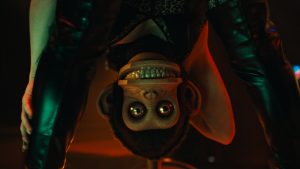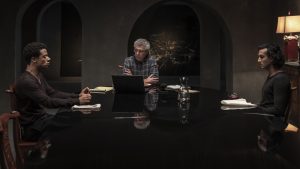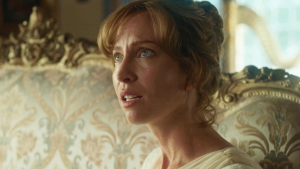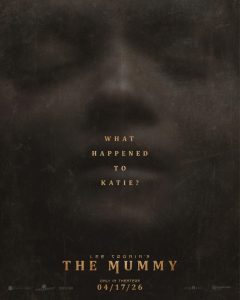
Warning: contains a banishment spoiler for The Traitors series 3, episode 7
Not looking in the ugly mirror is a basic rule for maintaining self esteem. Wherever yours hangs (mine’s in my in-laws’ downstairs bathroom), that harshly lit, unnaturally magnifying surface that only ever reflects back sagging jowls, baggy pores and surprise eyelid hairs is one to avoid. Slip past it and keep up the illusion that your face is still the same one from your graduation photos instead of the melted-wax, double-chinned imposter who gurns up at you from your Facetime screen like Gollum in a toilet.
It’d be straightforward if ugly mirrors only hung in café loos and bookshop stairwells. They don’t. There’s at least one in your home right now, and if it’s anything like mine, it’s playing The Traitors on BBC One and reflecting the ugliest truth of all: man, we are clueless.
The Traitors shows that not only are we clueless, but, more unflattering than that, we think that we’re clever. Wise is the man who knows that he knows nothing? Well, delusional is the Faithful who knows 100% that one of their fellow players is a Traitor.
To recap for the holdouts who refuse Reality TV like a hunger striker refuses a sandwich (piously and without prospect of joy): The Traitors welcomes 25 contestants to a castle in Scotland where Claudia Winkleman toys with them in fingerless gloves. Three are secretly selected as “Traitors” and convene each night to choose which of the remaining “Faithful” to murder/leave a note for saying they’ve been murdered. The Faithful have to sniff out the Traitors in the nightly roundtables after which everybody votes on who to banish from the castle. The Traitors have to do whatever they can – form alliances, misdirect, and sow suspicion about Faithfuls – not to get caught.
In the most recent episode, a Traitor was successfully banished, and the Faithful reacted like chimps in a blood frenzy. The chap who’d petitioned for the Traitor’s removal leapt up, slapped his hands on the table and jumped around shouting “I did it! I did it! Day one! Day one! Come on! Come on! From the train! On that train!”
Here, it’s useful to know that the contestants arrive on the show via train. Crucially though, in light of the man celebrating having pinpointed a Traitor as far back as the train, is that there are no Faithfuls or Traitors on that train. The roles aren’t assigned until after they reach the castle. What he’s celebrating is having had a random hunch early doors, and that hunch, just as randomly, turning out to have been right. It’s stupid, and it’s also how the entire thing works.
The Traitors may as well be named “Confirmation Bias Castle” because every 100%, dead-on conviction the Faithful have about who’s a Traitor is a guess shored up by nonsense. Somebody blinks at the wrong time – they’re a Traitor. Somebody looks down at the wrong time – Traitor. Somebody is too nice, or too rude, or too loud, or too quiet, or too anything – Traitor, Traitor, Traitor.
Have your name mentioned at all, in fact, and you’re a Traitor. The same cynical engine that keeps pumping existing-IP franchises into cinemas because we all flock to stuff we’ve seen and heard before, drives the Faithfuls’ accusations.
Once a name takes hold in a group, reasons are found to stand in for evidence in a post-rationalisation free-for-all. Faithfuls’ suspicions go from 0 to 60 in seconds until they’re willing to stake their survival in the game on what can only ever be a stab in the dark. Bonded groups convince themselves of how right they are, and how Faithful they are. Nobody talks about guesses, only what they know. They’re convinced that their groundless theories, based on nothing but social bonds and post hoc fallacy, are fact.
It’s striking how attached players get to their hunches. Even when new evidence presents itself, they’ll ignore or deny it to suit the version of events they’ve already decided on. Even after being proven wrong when a banished player reveals themselves to have been Faithful, they still nurse suspicions and try to justify their wrongness.
It’s not a pretty reflection, but like that waxy-faced jowly one in the ugly mirror, it’s also the unfortunate truth. The Traitors’ pantomime of conviction based on affiliation, and guesses dressed as fact, is exactly how we all do it too. Ever read a headline and filed it mentally away, but not bothered to investigate further? That’s Livi seizing on Freddie’s name and choosing him as her hill to die on. Ever formed a trust attachment to somebody based solely on proximity? That’s the Faithful crossing their fingers that OG player Leon had survived the episode six game instead of latecomers Fozia and Alexander. Ever been absolutely sure of something but subsequently proved wrong, and then done it again and again and again? That’s the players almost every episode.
The Traitors has developed into ingenious television that’s precision-engineered to captivate its audience. It’s both a brilliant TV distraction and a high-camp laugh. In these post-expert, alternative-fact, disinformation-rife days though, it’s also getting harder to squint away from the unflattering reality it reflects.
The Traitors series three airs at 9pm on Wednesdays, Thursdays and Fridays on BBC One and iPlayer.
The post If The Traitors Proves Anything, It’s That Nobody Knows a Damn Thing appeared first on Den of Geek.











